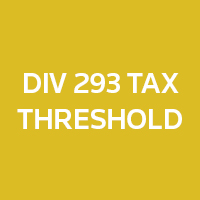An extra 44,000 taxpayers have been hit with an additional 15% Division 293 tax on their superannuation contributions for 2017-18. The ATO has issued these Div 293 tax assessments to a further 90,000 taxpayers after an initial run in late 2018. Of these, around 44,000 taxpayers will receive their first Div 293 assessments following the reduction in the income threshold to $250,000 for 2017-18 (previously $300,000). And with Labor proposing to further reduce the income threshold to $200,000, even taxpayers who didn’t receive a Div 293 assessment this year should start planning now.
Individuals with income and super contributions above $250,000 are subject to an additional 15% Div 293 tax on their “low tax contributions” (ie concessional contributions). Concessional contributions include all employer contributions, such as the 9.5% super guarantee and salary sacrifice contributions, and personal contributions for which a deduction has been claimed.
As a result of this Div 293 tax, the effective contributions tax is doubled from 15% to 30% for certain concessional contributions (up to the concessional cap).
The maximum Div 293 tax payable is $3,750 ($25,000 x 15%). Despite this extra 15% tax, there is still an effective tax concession of 15% (ie the top marginal rate – excluding the Medicare levy – less 30%) on concessional contributions.
An extra 44,000 taxpayers have been hit with the additional 15% Division 293 tax for the first time on their superannuation contributions for 2017-18. This follows the reduction in the Div 293 income threshold to $250,000 for 2017-18 (previously $300,000). The income threshold of $250,000 uses a broad tax definition and also includes the low tax contributions (up to $25,000). This means that the Div 293 tax can be triggered for taxpayers with incomes below $250,000 (although the additional tax only applies to amounts above the threshold).
A taxpayer has the option of paying the Div 293 tax liability using their own money, or by electing to release an amount from an existing super balance by completing a Div 293 election form. If a taxpayer makes such an election, the ATO will direct the nominated super fund to release the amount elected to the ATO. Although the election can be made within 60 days using the ATO approved form, a taxpayer still needs to pay the additional tax by the due date to avoid interest charges.
Negative gearing and many salary packaging arrangements generally will not assist in bringing a taxpayer under the $250,000 income threshold. However, astute taxpayers should be aware of the following:
-A person who expects to exceed the high-income threshold may wish to consider scaling back their super contributions to only the mandatory 9.5% super guarantee contributions (which are still subject to the Div 293 tax).
-Reconsider making additional contributions for a financial year if also anticipating a large one-off amount of taxable income during an income year. For example, an employment termination payment or a large net capital gain (eg from the sale of an investment property) will flow through into the taxpayer’s taxable income and may push them above the high-income threshold and trigger the Div 293 tax for that income year.
-Taxpayers that only exceed the $250,000 income threshold due to their investment income (especially franked dividends) should consider transferring such investments into another structure, such as a bucket company, rather than in their personal capacity, so that this additional income (grossed up for franking credits) is not counted towards their Div 293 income threshold. Such a structure would have its own additional costs, CGT implications and reduced flexibility but could nevertheless save an impacted taxpayer up to $3,750 per year in Div 293 tax.
-Labor, if elected, has proposed to further reduce the Div 293 income threshold to $200,000 and drag more taxpayers into the Div 293 net.
Need more guidance?
If you are one of these unlucky taxpayers to be hit with Div 293 tax, talk to us today about your options to pay the tax personally or withdraw an amount from your super fund. Likewise, we can discuss your income tax and superannuation situation to investigate strategies to stay under the Div 293 threshold or minimise the amount of tax payable.



